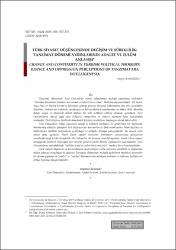| dc.contributor.author | Aydoğdu, Nergiz Yılmaz | |
| dc.date.accessioned | 2021-12-12T16:49:34Z | |
| dc.date.available | 2021-12-12T16:49:34Z | |
| dc.date.issued | 2020 | |
| dc.identifier.issn | 2458-9071 | |
| dc.identifier.issn | 2458-9071 | |
| dc.identifier.uri | https://app.trdizin.gov.tr/makale/TkRFek5qQXlNZz09 | |
| dc.identifier.uri | https://hdl.handle.net/20.500.11857/2013 | |
| dc.description.abstract | Tanzimat döneminde Yeni Osmanlılar olarak adlandırılan muhalif aydınların söylemleri“Osmanlı idaresinin zulmüne son vermek ve adaleti tesis etmek” ilkelerine dayanmaktadır. Ali Suavi,Ziya Paşa ve Namık Kemal’in liderliğini yaptığı grubun Osmanlı hükümetine dair ileri sürdüklerieleştiriler, hükümetin istibdadı, vatandaşların hürriyetlerinin kısıtlanması ve halkın kötü idaredendolayı sosyal ve ekonomik olarak düşkün bir hale mahkûm edilmiş olmasına yöneliktir. YeniOsmanlıların idareyi işgal eden ehliyetsiz memurlara ve onların zulmüne karşı başlattıklarımuhalefet, Türk düşünce tarihinde demokratik düşünce hareketinin başlangıcı olarak kabul edilir.Yeni Osmanlılar, İslam inancının sosyal ve kültürel özellikleri ile şekillenmiş bir toplumda,benimsemiş oldukları görüşleri, batı düşüncesinin kavramları ile ifade etmek yerine İslam düşünce vekültüründen aldıkları kavramlarla açıklamaya ve anlaşılır kılmaya çalışmışlardır. Bu süreçte sözüedilen genç aydınlar, klasik İslam siyaset teorisinin kavramları çerçevesinde görüşlerinitemellendirmeyi tercih etmişlerdir. Bu bakımdan söz konusu muhalif aydınlar, klasik İslam siyasetanlayışında iktidarın meşruiyeti için zorunlu görülen adalet ilkesini söylemlerine taşımışlardır. YeniOsmanlıların muhalefetinde “adaletin tesisi ve zulme karşı mücadele” merkezi bir rol oynamaktadır.Türk siyasal düşüncesi ve kavramlarının modernleşme tarihi süresince süreklilik ve değişiminedikkat çekmeyi amaçlayan bu çalışma, Tanzimat döneminde muhalif aydınların metinleri üzerindenbir okuma yapmayı ve “adalet” ve “zulüm” kavramlarının dönüşen muhteva ve kullanım özellikleriniortaya koymayı amaçlamaktadır. | en_US |
| dc.description.abstract | During the Tanzimat Era, the rhetoric of the dissident intelligentsia called the Young Ottomans was grounded on the principles of “ending oppression of the Ottoman administration and establishing justice.” Led by Ali Suavi, Ziya Pasha and Namik Kemal, the group expressed criticism towards the Ottoman government regarding its repression, restrictions on the freedom of citizens, and the deterioration of people’s socio-economic conditions led by poor governance. The movement that the Young Ottomans initiated against the incompetent and oppressive government officials is regarded as the precursor of the democratic thought movement in the history of Turkish political thought. The Young Ottomans attempted to explain and elucidate the views that they adopted in a society shaped by the social and cultural virtues of the Islamic faith, using the concepts inherited from the Islamic thought and culture rather than the concepts derived from the Western thought. In this period, the aforementioned young intelligentsia preferred to build their thoughts around the concepts of classical Islamic political theory. In this regard, said dissident intelligentsia integrated the principle of justice into their rhetoric, which was seen as a necessary condition for government legitimacy according to the classical approach of Islamic politics. “Establishment of justice and struggle against oppression” have essential roles to play in the Young Ottomans’ opposition. Intending to attract attention to the continuity and changes of Turkish political thought and concepts throughout the modernization process, this paper aims to review the writings of the dissident intelligentsia in the Tanzimat Era and to reveal the changing content and usage characteristics of the justice and oppression concepts. • | en_US |
| dc.language.iso | tur | en_US |
| dc.relation.ispartof | Selçuk Üniversitesi Türkiyat Araştırmaları Dergisi | en_US |
| dc.rights | info:eu-repo/semantics/openAccess | en_US |
| dc.subject | [No Keywords] | en_US |
| dc.title | TÜRK SİYASET DÜŞÜNCESİNDE DEĞİŞİM VE SÜREKLİLİK: TANZİMAT DÖNEMİ AYDINLARININ ADALET VE ZULÜM ANLAYIŞI | en_US |
| dc.title.alternative | CHANGE AND CONTINUITY IN TURKISH POLITICAL THOUGHT: JUSTICE AND OPPRESSION PERCEPTIONS OF TANZIMAT ERA INTELLIGENTSIA | en_US |
| dc.type | article | |
| dc.department | Fakülteler, İktisadi ve İdari Bilimler Fakültesi, Siyaset Bilimi ve Kamu Yönetimi Bölümü | |
| dc.identifier.volume | 0 | en_US |
| dc.identifier.startpage | 357 | en_US |
| dc.identifier.issue | 50 | en_US |
| dc.identifier.endpage | 373 | en_US |
| dc.relation.publicationcategory | Makale - Ulusal Hakemli Dergi - Kurum Öğretim Elemanı | en_US |
| dc.institutionauthor | Aydoğdu, Nergiz Yılmaz | |



















